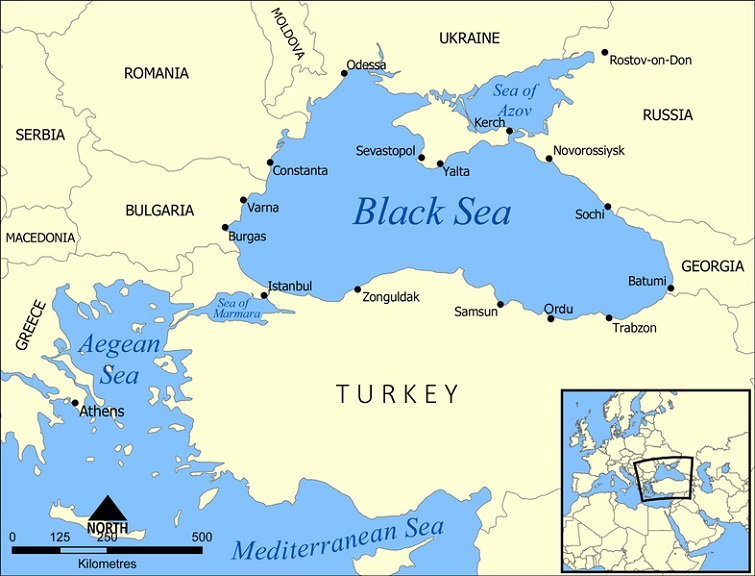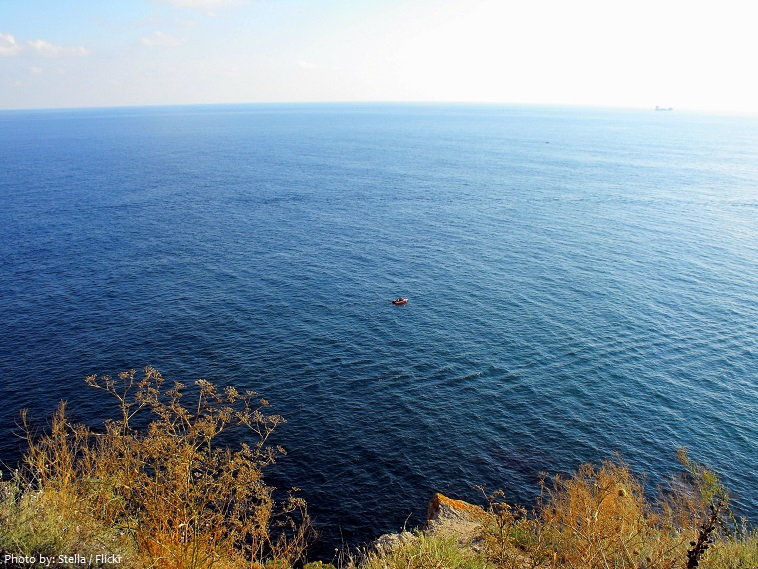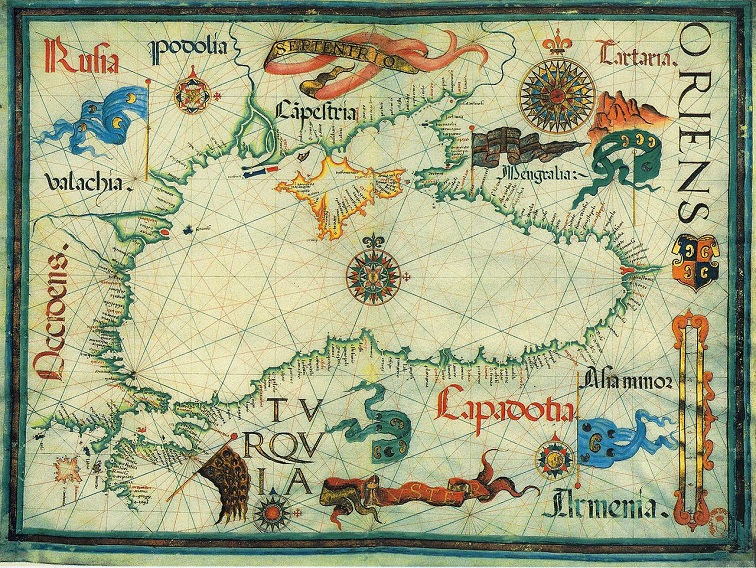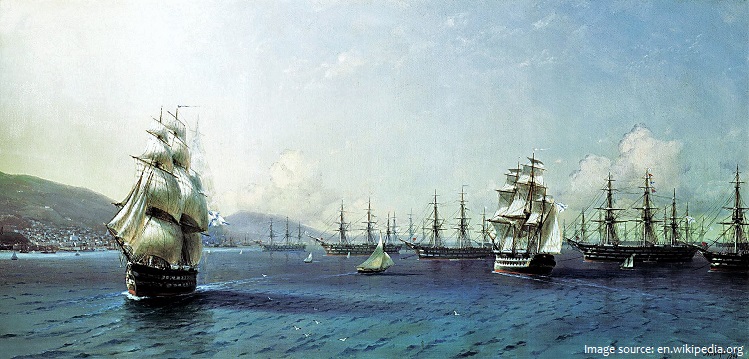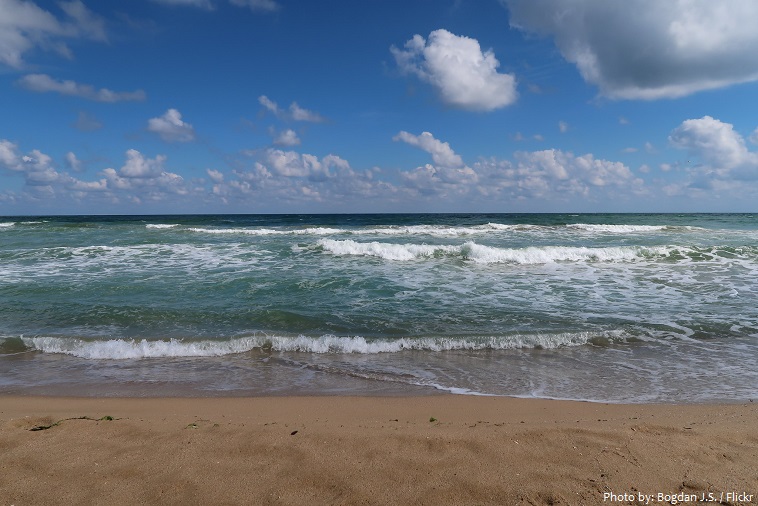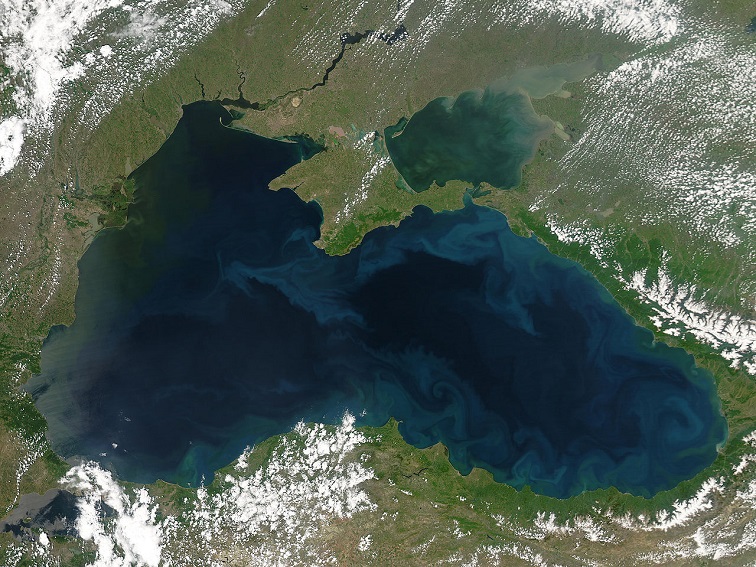The Black Sea is a large inland sea situated at the southeastern extremity of Europe.
It is bordered by Ukraine to the north, Russia to the northeast, Georgia to the east, Turkey to the south, and Bulgaria and Romania to the west.
The roughly oval-shaped body of water has a surface area of 436,400 square kilometers (168,500 square miles).
The longest east–west extent is about 1,175 km (730 miles). The shortest distance between the tip of Crimea and Cape Kerempe to the south is about 260 km (160 miles).
It has a maximum depth of 2,212 meters (7,257 feet), and a volume of 547,000 cubic kilometers (131,000 cubic miles).
The Black Sea is connected to the Atlantic Ocean via the Mediterranean and Aegean Seas and various straits.
To its east, the Kerch Strait links the Sea to the smaller Sea of Azov.
The Black Sea contains only a few small islands, the largest being Zmiyinyy (Fidonisi) of Ukraine.
It is supplied by a number of major rivers, including the Danube, Dnieper, Southern Bug, Dniester, Don, and the Rioni.
Navigation on the Black Sea has been known from the time of the ancient Phoenicians.
In ancient Greek myths, the sea — then on the fringe of the Mediterranean world — was named Pontus Axeinus, meaning “Inhospitable Sea.” Later explorations made the region more familiar, and, as colonies were established along the shores of a sea the Greeks came to know as more hospitable and friendly, its name was changed to Pontus Euxinus, the opposite of the earlier designation.
It was across its waters that, according to legend, Jason and the Argonauts set out to find the Golden Fleece in the land of Colchis, a kingdom at the sea’s eastern tip (now Georgia).
The Black Sea has witnessed the rivalries of Hittites, Carians, Thracians, Greeks, Persians, Scythians, Romans, Byzantines, Goths, Huns, Avars, Bulgars, Slavs, Varangians, Crusaders, Venetians, Genovese, Tatars, Ottomans, and Russians.
Its history for much of the 18th and all of the 19th century was the struggle for supremacy of the two major powers on its shores: the Ottoman Empire and Russia. In the course of this struggle by the mid-19th century, Russia emerged as the clear winner.
Regular meteorological observations were initiated in the first quarter of the 19th century, and a biological station at Sevastopol, on the Crimean Peninsula, was founded in 1871.
The Black Sea was a significant naval theatre of World War I and saw both naval and land battles of World War II.
It has been erroneously suggested that the name was derived from the color of the water, or was at least related to climatic conditions. Black or dark in this context, however, referred to a system in which colors represent the cardinal points of the known world. Black or dark represented the north – red the south – white the west – and green or light blue for the east.
The Black Sea is one of four seas named in English after common color terms — the others being the Red Sea, the White Sea and the Yellow Sea.
Comb jellyfish were introduced into the Black Sea in 1982 – after 8 years they totaled about 900 million tons. They have caused $350 million in losses to the Black Sea’s fishing and tourism industries.
Black Sea is a favorite of scientists, specifically because its lower levels are nearly biologically dead due to weak ventilation of its deep layers. Though the diversity of its sea-life is less than that of the ocean or more saline seas, it is unusual, beautiful, and intriguing. Considered in some ways more suitable for research, its sea ecology is more easily comprehensible to scientists. Its ecosystem responds quickly to external influences, both to natural occurrences, such as environmental factor fluctuations, or anthropogenic effects, such as fisheries, pollution, or industrialization in the surrounding area.
The term caviar traditionally refers only to roe from wild sturgeon in the Caspian and Black Sea (Beluga, Ossetra and Sevruga caviars).
Julius Caesar proclaimed his celebrated words “Veni. Vedi, Veci” (I came, I saw, I conquered) in Turkey when he defeated Pontus, a formidable Kingdom in the Black Sea Region of Turkey.
The oldest processed gold in the world, arguably left by Old Europeans, was found in Varna, and the Black Sea is said to have been sailed by the Argonauts.

